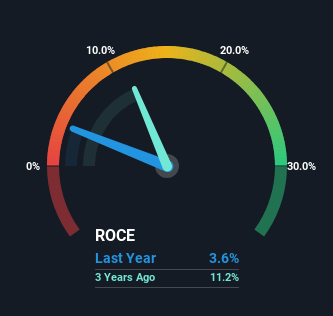Tongyu Heavy Industry (SZSE:300185) Is Reinvesting At Lower Rates Of Return

If you're not sure where to start when looking for the next multi-bagger, there are a few key trends you should keep an eye out for. One common approach is to try and find a company with returns on capital employed (ROCE) that are increasing, in conjunction with a growing amount of capital employed. If you see this, it typically means it's a company with a great business model and plenty of profitable reinvestment opportunities. However, after briefly looking over the numbers, we don't think Tongyu Heavy Industry (SZSE:300185) has the makings of a multi-bagger going forward, but let's have a look at why that may be.
What Is Return On Capital Employed (ROCE)?
For those who don't know, ROCE is a measure of a company's yearly pre-tax profit (its return), relative to the capital employed in the business. To calculate this metric for Tongyu Heavy Industry, this is the formula:
Return on Capital Employed = Earnings Before Interest and Tax (EBIT) ÷ (Total Assets - Current Liabilities)
0.036 = CN¥328m ÷ (CN¥15b - CN¥6.3b) (Based on the trailing twelve months to March 2024).
So, Tongyu Heavy Industry has an ROCE of 3.6%. In absolute terms, that's a low return and it also under-performs the Machinery industry average of 5.6%.
See our latest analysis for Tongyu Heavy Industry

Above you can see how the current ROCE for Tongyu Heavy Industry compares to its prior returns on capital, but there's only so much you can tell from the past. If you're interested, you can view the analysts predictions in our free analyst report for Tongyu Heavy Industry .
What The Trend Of ROCE Can Tell Us
On the surface, the trend of ROCE at Tongyu Heavy Industry doesn't inspire confidence. Around five years ago the returns on capital were 7.7%, but since then they've fallen to 3.6%. On the other hand, the company has been employing more capital without a corresponding improvement in sales in the last year, which could suggest these investments are longer term plays. It's worth keeping an eye on the company's earnings from here on to see if these investments do end up contributing to the bottom line.
On a separate but related note, it's important to know that Tongyu Heavy Industry has a current liabilities to total assets ratio of 41%, which we'd consider pretty high. This effectively means that suppliers (or short-term creditors) are funding a large portion of the business, so just be aware that this can introduce some elements of risk. While it's not necessarily a bad thing, it can be beneficial if this ratio is lower.
What We Can Learn From Tongyu Heavy Industry's ROCE
Bringing it all together, while we're somewhat encouraged by Tongyu Heavy Industry's reinvestment in its own business, we're aware that returns are shrinking. And investors may be recognizing these trends since the stock has only returned a total of 17% to shareholders over the last five years. Therefore, if you're looking for a multi-bagger, we'd propose looking at other options.
One final note, you should learn about the 3 warning signs we've spotted with Tongyu Heavy Industry (including 1 which is a bit concerning) .
For those who like to invest in solid companies, check out this free list of companies with solid balance sheets and high returns on equity.
Valuation is complex, but we're here to simplify it.
Discover if Tongyu Heavy Industry might be undervalued or overvalued with our detailed analysis, featuring fair value estimates, potential risks, dividends, insider trades, and its financial condition.
Access Free AnalysisHave feedback on this article? Concerned about the content? Get in touch with us directly. Alternatively, email editorial-team (at) simplywallst.com.
This article by Simply Wall St is general in nature. We provide commentary based on historical data and analyst forecasts only using an unbiased methodology and our articles are not intended to be financial advice. It does not constitute a recommendation to buy or sell any stock, and does not take account of your objectives, or your financial situation. We aim to bring you long-term focused analysis driven by fundamental data. Note that our analysis may not factor in the latest price-sensitive company announcements or qualitative material. Simply Wall St has no position in any stocks mentioned.
About SZSE:300185
Tongyu Heavy Industry
Engages in the research and development, manufacture, and sale of forgings and castings.
Low and slightly overvalued.
Market Insights
Community Narratives




